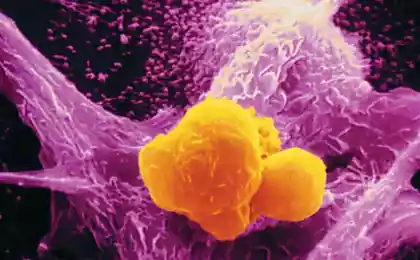389
Boris Obydov: hunger helps to recover faster
At the appearance of first symptoms until the moment when the fever will decrease and will have a real, natural, hunger, intake of food should be kept to a minimum, and even better to end the meal.
When extreme weakness or if the acute inflammatory process lasted a long time, when a noticeable depletion of the patient, it is advisable to give such easily digestible foods as white of eggs, milk and bread from whole grain with butter in combination with raw and stewed fruits, with vegetable salads, seasoned with lemon juice or olive oil.
Drinking plenty of water is regulated by the desire of the patient, but it should be warn not to drink more than required to satisfy thirst. This is fundamentally important from a physiological point of view: large amount of water injected, an overly diluted blood and other fluids and secretions of the body, which further enhances fatigue and reduces the body's resistance to illness. In water to enhance the taste and benefits you can add unsweetened sour fruit juices – orange, grapefruit or lemon in the ratio 1:3.
Very effective fresh pineapple juice (if there is hyperacidity of the stomach). The juice is acidic and polycyclic fruit, on the one hand, does not contain unduly excite the digestive process of carbohydrates or protein, and with another – is rich with the best medicine of nature – mineral salts in organic form.
Attention! Sweet grapes and sweetened juice should not be given to the patient with the disease, followed by acute fever, because they contain too much sugar, provoking the processes of digestion and assimilation of food, harmful fermentation, the temperature rise and accelerating the development of other signs of disease.
Total abstinence from food during acute febrile conditions is of primary importance. In a number of diseases that involve the painful process of digestive tract, fasting is recommended for several days after all symptoms of inflammation have disappeared. And there is no greater mistake than trying to support and strengthen the patient an abundance of food and drink, and even worse – stimulants and tonics.
Unacceptable coercion to food and drink, and often on the orders of the attending doctors, when the body is wanting to recover, causes the stomach to throw away food immediately after swallowing. Aversion to eating during acute diseases, whether medical crises or crises of diseases naturally because of the entire body, including the mucous membrane of the stomach and intestines, is busy working on the allocation, not assimilation.
Nausea, slimy, foul-smelling discharge, constipation, alternating diarrhea, and other similar processes – all this testifies to the fact that the body is unable to absorb and assimilate food. Usually, the digestive tract acts like a sponge which absorbs the elements of nutrition; but in acute diseases the process changes direction: the sponge is squeezed" – emit large quantities of harmful substances.
The processes of digestion and assimilation are suspended. In fact, the entire body is in a state of prostration, weak and inactive. Vitality concentrate on cleansing and healing processes. Accordingly, there is no demand for food. It is a fact that people starving in, say, four weeks, during serious acute illness lose weight less than a person starving four weeks of being healthy.
For these reasons, the food ingested during the acute illness: — not properly digested, not absorbed and not converted into healthy blood and tissue, but instead she aged and decays, filling the system with toxins and unhealthy gases; — seriously inhibiting the release of harmful substances through the stomach and intestines, causing them to work at digestion and absorption;- diverts the vital forces from the fight against the disease, slinging them more than useless food ballast.
All of the above explains why the adoption of food during a fever is usually accompanied by fever and worsening of other indicators of the disease. As long as there are signs of inflammation, fever, no appetite, don't be afraid to completely abstain from food, and if necessary, even for five, six and seven weeks.
In my experience, there were several patients who did not take food, with the exception of water, diluted juices, sour fruit, longer than seven weeks, and then quickly and completely recovered.
Gastritis, ulcerative colitis, appendicitis, peritonitis, dysentery, abstinence from food is a must!
Can't drink even the milk until inflammation and fever subside completely, then a few days you must wait for therapeutic purposes for the recovery of the affected tissues. A serious chronic consequences of these diseases are caused by early onset of food – food not allow the healing forces of nature to recreate the membranes are disrupted and the affected organs.
After prolonged fasting to eat should be very careful. You can use to take one tablespoon of boiled rice, one or two spoons of cooked plums or other stewed fruit. Within a few days or weeks after fasting, depending on the violence of an acute disease or healing crisis, you need to stick to a diet consisting mainly of raw fruits (e.g., oranges, grapefruit, apples, pears, grapes and fresh vegetables (e.g., lettuce, celery, cabbage, green onions, tomatoes, cucumbers). With vegetables you should not use condiments except for lemon juice or olive oil.published
Author: Boris Avidov
P. S. And remember, only by changing their consumption — together we change the world! ©
Source: vk.com/doc66029316_393012206?hash=ad31eaa4bc205a5b68&dl=6fbc98bff80295a9f6























